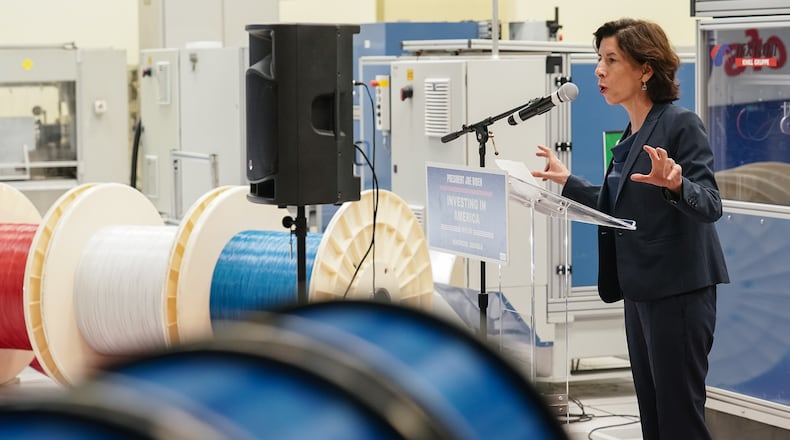U.S. Commerce Secretary Gina Raimondo and Sen. Raphael Warnock stood in front of stools of red, white and blue fiber optic cables Friday afternoon to announce a Norcross job expansion aimed at widening broadband internet access across Georgia.
Gwinnett County-based OFS said it will add 100 workers in the next few years to expand capacity at its manufacturing facility along I-85. The company’s executives credited the additional jobs to demand spurred by federal programs targeting the digital divide, where rural Americans lack broadband internet infrastructure.
OFS CEO and President Holly Hulse said the expansion would not be possible without $1.3 billion that Georgia received from the Broadband Equity, Access and Deployment (BEAD) program within the Infrastructure Investment and Jobs Act. The bill, passed with bipartisan support, was championed by President Joe Biden.
“While we may take high-speed internet access for granted, there are many among us who still do not have this access,” Hulse said.
Raimondo said 300,000 Georgians currently lack internet access, which she called “outrageous in this day and age.” Warnock, D-Georgia, said he’s traveled to rural corners of the state and found that nearly every career, including the state’s vital agriculture industry, relies on having a stable internet.
“I spend a lot of time with farmers in Georgia, and they’ll tell you that you can’t even farm without a good broadband connection,” he said. “... Broadband is to the 21st century what electricity was to the 20th century.”
Credit: Elijah Nouvelage for the AJC
Credit: Elijah Nouvelage for the AJC
Rural internet efforts have been a high priority in Georgia for several years, with the state investing hundreds of millions of dollars to shore up internet access. Gov. Brian Kemp allocated $640 million of federal COVID-19 relief funds toward broadband initiatives, and the recent $1.3 billion is only adding to those efforts.
OFS, which traces its roots back to telephone inventor Alexander Graham Bell, manufactures fiber optic cables that are able to carry high-speed internet information. Atlanta has long been the fiber capital of the Southeast due to the city’s telecommunications industry, which created an infrastructure network that has led the region to recently emerge as a hub for data centers and other internet-based companies.
The company’s Norcross facility was once slated to be redeveloped into a sprawling movie studio in the late 2010s, but those efforts fell apart amid a flurry of lawsuits and failed land negotiations. Gwinnett County bought 103 acres from OFS in 2018, which is perennially leased back to the company.
The amount of extra capacity the expansion will be able to produce was not provided. The facility currently employs about 300 workers, who Communications Workers of America President Claude Cummings said are unionized. The new 100 workers will also be part of the union, he said.
The BEAD program consists of more than $42 billion of investment to address broadband gaps across the country, and Raimondo said they’re “still in the early stages of getting (the funds) to every state.”
“I can say with confidence that it’s enough money to make sure that by the end of the decade, everyone across the country will have high-speed, affordable, high-quality internet,” she said.
About the Author
Keep Reading
The Latest
Featured




